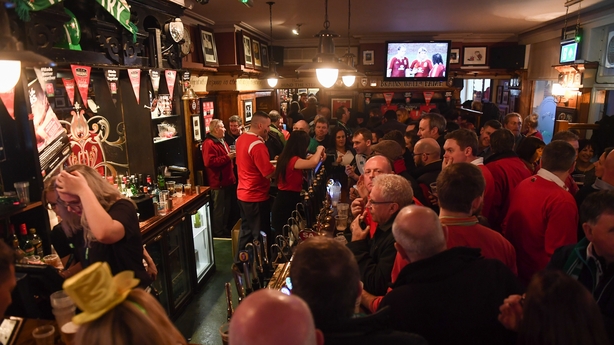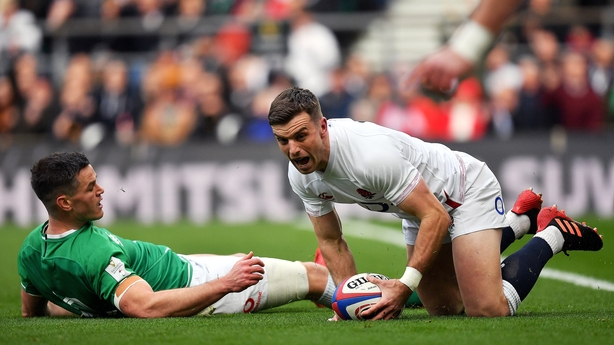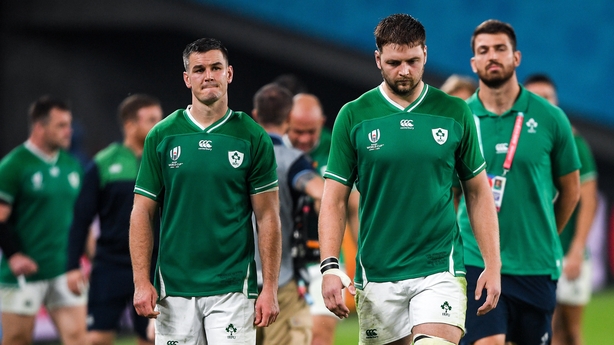The Six Nations is a welcome arrival into our fairly sparse sporting calendar even if it isn't quite the clap-happy jamboree of years gone by.
All but the most rugby-phobic people on this island will surely agree.
Through January, we were sustained by the English Premier League and Pro14 rugby, very much the bare skeleton of any sporting year.
The Six Nations injects some much-needed national event hype into the equation.
Nonetheless, like everything else, it's a rather more subdued affair in 2021.
Possibly more than any other sporting event, the Six Nations feels the loss of the pub.
Die-hard soccer people, resentful at rugby's growth in the 21st century, have often sneered at it as a part-social event, part sporting competition. Sport for people who don't like sport, as was once said of Wimbledon (the tennis tournament, not the soccer team).
There is obviously a deep-rooted suspicion that there's a large cohort of people whose fondness for the oval ball game - which usually dates back to around 2004 - is merely a by-product of their much greater fondness for drinking alcohol in company on a Saturday afternoon.
Six Nations 2021 will be an acid test of this constituency's commitment to the sport.
By their nature, this grouping are fairly relaxed and light-hearted when it comes to sport but they should be aware that their behaviour is being monitored, in so far as this can be done in the current climate, by the anoraks, who are mainly drawn to rival sports, and who have little time for them.

Ironically, from next year, the pub may become even more central to the Six Nations weekend experience given the strong likelihood that the tournament will disappear behind a paywall by 2022. Incoming stakeholders CVC Capital Partners don't usually waste too much time in getting this done. But for 2021, this communal experience is out of reach.
The absence of fans is especially devastating to the Six Nations ambience. The fun of the 'away day', in particular, is key to its appeal. Indeed, the cynics would have it that the reason Italy have been retained in the tournament at the expense of Georgia is because the revellers fancy a weekend in Rome rather than Tbilisi.
Does the lack of buzz and hoopla reduce the pressure on teams to perform to any degree? Well, it certainly doesn't appear to be reducing any pressure on Andy Farrell.
Measured in terms of win-loss ratio, 2020 was hardly a disastrous performance. It isn't the first, or it won't be the last, 'even-year' Six Nations in which Ireland win all their home games but end up losing in both Paris and London. In this day and age, that probably amounts to a par score.
What did disappoint was the lack of evolution or progression in the team's playing style. There was a chaotic, slightly ragged element to a lot of Ireland's displays in the 2020 campaign. Things felt a bit more anarchic than in the Joe Schmidt days - but not in a good way.

Ireland's set-pieces, especially the lineout, really began to creak last year, while the more off-the-cuff, free-form attacking game, that Farrell has spoken of nurturing, didn't appear to be much in evidence - or at least it isn't yielding too many visible results.
Ex-Leinster and Ireland hooker Shane Byrne said at the weekend that a failure to win either of their home games against England and France will see the pressure mount further on Farrell.
Perhaps we're in danger of getting sucked into our old habit of regarding the Six Nations as the be-all and end-all, at the expense of the bigger picture?
Maybe a humdrum Six Nations, played out behind closed doors, is the ideal opportunity for Ireland to embrace a more experimental mindset.
In the days and weeks after Ireland lose the World Cup quarter-final, many in the rugby community resolve never again to become too wound up by the Six Nations.
Some of the real hard-edged radicals demand we start treating the Six Nations like a development tournament, like the Allianz League or something.
None of this fretting about points difference on the final day or writing sonnets in honour of the latest herculean effort against 'the auld enemy' - no, we should take the longer view.
Everything should be scientifically pitched and arranged so as to ensure we peak at the next quarter-final, regardless of its impact on the short-term.

Speaking ahead of last year's tournament, Jamie Heaslip was slightly sceptical of this mindset.
Four years out from a World Cup is too early to start thinking in those terms, he indicated. There are too many variables, too much water yet to flow under the bridge, to be able to plan so methodically for a single game just under four years down the track. Two years out from the tournament, Heaslip suggested, was a more reasonable time-frame from which to start seriously preparing with the World Cup in mind.
Ireland's World Cup record has obviously become a source of acute embarrassment, such that it feels nothing else really matters now.
The Irish rugby team are the only original top-eight nation never to make it past the quarter-final (though it could be pointed out here that Scotland only did so in 1991, when South Africa were still banned, thus leaving one more dud team in the quarter-final).
The Six Nations, by contrast, has a been-there, done-that vibe, which has contributed to the air of listlessness which has attached to the tournament for its last two editions.
The Rugby World Cup record is the big millstone around Irish rugby's neck, and nothing the team achieves in the Six Nations can do anything to remove it.
At the moment, there is little sense that Ireland are approaching this World Cup cycle with a determined purpose or constructing something impressive in the medium-term.
Johnny Sexton remains the country's first-choice out-half, a decision made for Farrell by Joey Carbery's persistent injury problems but one which still causes some disquiet given Sexton's age. The Leinster 10 apparently still plans to be in place to play by 2023.
Still, Caelan Doris (injured for this weekend) has come through, Hugo Keenan has impressed at full-back and Tadhg Beirne's form is especially strong currently. Our 'United Nations' element - Gibson-Park and James Lowe - add undoubted quality to the line-up.
'Rugby Planet' have titled their preview 'Another Six Nations of mediocrity beckons for Ireland'.
The widespread expectation is that Ireland will finish third or fourth, potentially second if they take a bigger scalp.
The fixation with winning the Six Nations, which reached a high pitch over the past decade, has receded somewhat. Many will watch with a view to how Ireland are progressing in terms of the World Cup cycle. Of course, it would be just like Ireland to peak around now.


